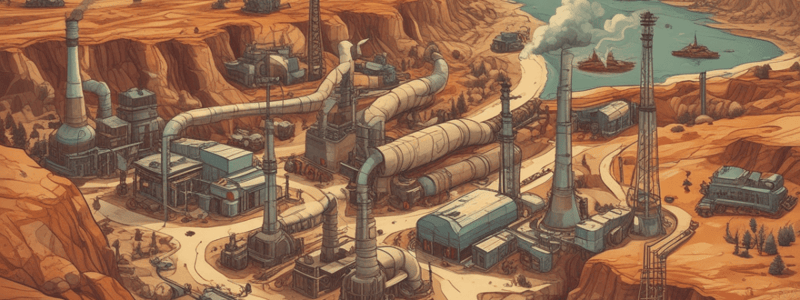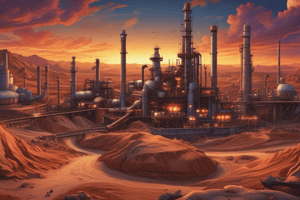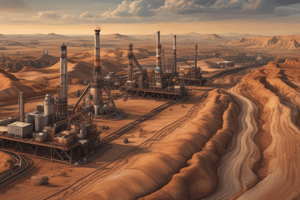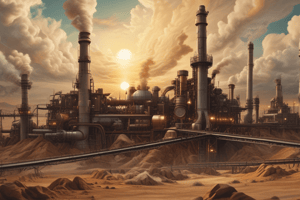Podcast
Questions and Answers
What is the primary source of organic matter that forms fossil fuels?
What is the primary source of organic matter that forms fossil fuels?
- Large animals
- Plants or algae (correct)
- Microorganisms
- Fungi or bacteria
What is the process by which fossil fuels are formed?
What is the process by which fossil fuels are formed?
- Low temperature and low pressure
- Low pressure and high temperature
- High temperature and low pressure
- High pressure and high temperature (correct)
What is the byproduct of burning fossil fuels?
What is the byproduct of burning fossil fuels?
- Carbon dioxide and water (correct)
- Carbon monoxide and oxygen
- Hydrogen and helium
- Nitrogen and oxygen
How do fossil fuels differ from renewable energy sources?
How do fossil fuels differ from renewable energy sources?
What is the term for fossil fuels in a liquid state?
What is the term for fossil fuels in a liquid state?
What is the primary component of natural gas?
What is the primary component of natural gas?
What is the main advantage of fossil fuels in terms of energy production?
What is the main advantage of fossil fuels in terms of energy production?
What is the method used to extract natural gas from underground rock formations?
What is the method used to extract natural gas from underground rock formations?
What is a major disadvantage of burning fossil fuels?
What is a major disadvantage of burning fossil fuels?
What is a characteristic of fossil fuels that allows them to be used to meet changing energy demands?
What is a characteristic of fossil fuels that allows them to be used to meet changing energy demands?
What is the primary consequence of the increased levels of greenhouse gases in the environment?
What is the primary consequence of the increased levels of greenhouse gases in the environment?
What is the primary source of acid rain?
What is the primary source of acid rain?
What is a common issue associated with the transportation of fossil fuels?
What is a common issue associated with the transportation of fossil fuels?
Why will fossil fuels eventually become scarce?
Why will fossil fuels eventually become scarce?
How can technological advances affect the use of fossil fuels?
How can technological advances affect the use of fossil fuels?
Flashcards are hidden until you start studying
Study Notes
Fossil Fuels Definition
- Fossil fuels are ancient fuels formed from the remains of living organisms, typically mined from underground and hundreds of millions of years old.
- Examples include coal, oil, and natural gas.
Formation of Fossil Fuels
- Fossil fuels form when organic matter, often plants or algae, is buried in an environment without oxygen.
- The plants are pushed to depths of several miles within Earth's crust, where pressure and heat cause them to transform into hydrocarbons.
Characteristics of Fossil Fuels
- Fossil fuels offer cheap, highly-concentrated energy.
- They pollute the air and are destined to run out.
Types of Fossil Fuels
- There are three types of fossil fuels: liquid (oil), gas (natural gas), and solid (coal).
- Oil can be found all over the world and is often extracted from ancient sea beds.
- Natural gas can be found in various underground rock formations and is mostly used in power plants to produce electricity.
- Coal is a black, sedimentary rock formed from the remains of ancient river mouths and is often mined on every continent.
Advantages of Fossil Fuels
- High energy density: Fossil fuels release large amounts of energy when burned.
- Low cost: Fossil fuels have been historically inexpensive due to their ubiquity and easy extraction.
- Abundant: Fossil fuels are available in large deposits, some of which could last for hundreds of years.
- Dispatchable: Fossil fuels can be adjusted according to demand, unlike renewable energy.
Disadvantages of Fossil Fuels
- Air pollution: Fossil fuels produce air pollution when burned, including carbon dioxide, carbon monoxide, and others.
- Climate change: Fossil fuels produce carbon dioxide, a greenhouse gas, leading to an increase in global temperatures.
- Water pollution: Fossil fuels can lead to unintentional water pollution, including runoff from coal mines and leaks in oil pipelines.
- Acid rain: The burning of coal can lead to acid rain, damaging everything from trees to fish eggs.
- Transportation: Fossil fuels have transportation issues, including maritime oil spills and escaped methane from natural gas pipelines.
- Non-renewable: Fossil fuels are non-renewable, meaning they will not be renewed during human lifetimes and will eventually run out.
Studying That Suits You
Use AI to generate personalized quizzes and flashcards to suit your learning preferences.




